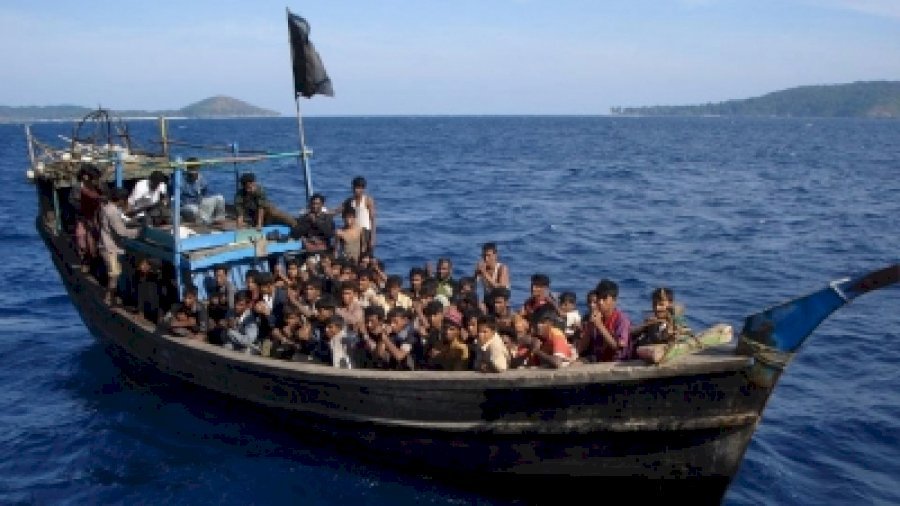
The UN, the US House Foreign Affairs Committee and well-known human rights organizations recognise that the targeted killings and expulsion of ethnic Rohingya of Myanmar constitute genocide
Musaddique Thange | Clarion India
AS the disastrous denouement of America’s 20-year war in Afghanistan and the world’s struggle against emerging new variants of Covid-19 continue to capture headlines, the plight of the Rohingya, an ethnic Muslim minority from Myanmar continues unabated. For hundreds of thousands of Rohingya who still remain in Myanmar in squalid camps, food and shelter are scarce. In Bangladesh’s infamous Cox’s Bazar, fires, disease and a prohibition against leaving the camp have resulted in the refugee camp turning into a vast open-air prison. Adding insult to injury is a cruel prohibition against establishing schools resulting in the denial of education to a generation of Rohingya refugee children.
While successive governments in Myanmar aimed at annihilating the ethnic Muslim Rohingya minority, those who survived the mass killings are eking out an existence that challenges our collective humanity.
There are renewed calls for the United States to recognize the Rohingya genocide, with growing consensus that such a declaration is long overdue. The US recognises China’s persecution of the Uighurs as genocide, but it does nothing to protect Rohingyas. The shocking lack of consistency adds to America’s already diminished international stature.
The Trump administration belatedly recognized that the mass detention camps, forced sterilization, forced labor, torture and brutal suppression of religious freedom of the Uighurs constituted genocide. The announcement raised hopes among those advocating global action on other mass persecution hot spots around the world, such as Myanmar.
Genocide is defined by international convention, as an “intent to destroy, in whole or in part, a national, ethnic, racial or religious group.” The Genocide Convention identifies several acts, of which, any committed with the above intent would constitute genocide. These include:
1. Killing members of the group
2. Causing serious bodily and mental harm to members of the group
3. Deliberately inflicting on the group conditions of life calculated to bring about its physical destruction in whole or in part
4. Imposing measures intended to prevent birth within the group
There is ample evidence of Myanmar’s military having committed all of these acts with the intent of destroying the Rohingya as a community. It is therefore not surprising that the United Nations, the US House Foreign Affairs Committee and well-known human rights organizations recognise that the targeted killings and expulsion of ethnic Rohingya of Myanmar constitute genocide.
According to “Doctors Without Borders,” the military operations against the Rohingya initiated in 2017 have resulted in the killing of thousands, with the estimated toll ranging from 9,000 to 43,000. This includes 730 children below the age of five. The killings and rapes triggered a mass exodus of the Rohingya of over 900,000 people, many of whom have been living in Bangladesh since then under appalling conditions.
For decades, the Rohingya have endured denial of citizenship, restrictions on movements, restrictions on marriage, etc. These intensified over the course of the last eight years, culminating in the massive military operations against the Rohingya in 2017, and continuing to this day in the form of “persecution, apartheid and severe deprivation of liberty.”
In the early days of the Biden administration, there were indications a formal review would be conducted in order to make a decision on recognising Myanmar’s persecution of the Rohingya as genocide. Such a recognition would go a long way in applying meaningful pressure on Myanmar’s military, that has so far been conducting the genocide with impunity. General Min Aung Hlaing, now the country’s President, is widely regarded as the man who masterminded a “campaign of terror,” against the Rohingya.
On September 18, 2018, the “Independent International Fact-Finding Mission on Myanmar,” a body mandated by the UN Human Rights Council released a report, detailing the massive military operations in Myanmar against the Rohingya and calling for the investigation and prosecution of Myanmar’s top military leaders for “genocide, crimes against humanity and war crimes”. The report is a harrowing account of how the Myanmar military took the lead in killing thousands of Rohingya civilians, enabled forced disappearances, mass gang rape and the burning of hundreds of villages in 2017. According to Human Rights Watch, at least 288 villages were partially or totally destroyed by fire. The genocide did not end in 2017, but is a lived reality for the minorities who continue to live within Myanmar’s borders.
On February 27, 2019, The US House Foreign Affairs Committee called on the administration to “recognize” the Rohingya Genocide. “The United States must not be ambiguous in the face of such appalling violations of human rights. Making a formal determination acknowledging the full extent of these crimes is a critical step toward accountability for the perpetrators of these crimes and justice for the victims,” the Committee had stated.
Thanks to Gambia which took Myanmar to the UN International Court of Justice (ICJ) at The Hague, the ICJ ordered Myanmar in January 2020, to “take all measures within its power,” to protect Rohingya Muslims from genocide.
International law does not require a group to be entirely destroyed before the campaign of violence can be declared as genocidal, thereby losing the preventative potential of such a determination. Without meaningful international action against Myanmar the situation is unlikely to improve. In January 2020, the UN Special Rapporteur on Myanmar urged the international community that “carrying on with business as usual will only allow the deplorable situation to persist.”
The need to hold the Myanmar government, especially it’s military accountable for their genocidal acts against the Rohingya, and to create conditions conducive to the Rohingyas’ safe return can no longer be deferred. Indeed, it is one of the greatest moral imperatives of our time.
___________
Musaddique Thange is an independent columnist based in the US, focusing on human rights and religious freedom. He can be reached on Twitter at @musa_thange

